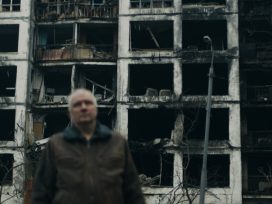Reading Ukraine
Should Russian literature be held accountable for creating a nationalist mood capable of inciting war on Ukraine? Calls for a halt on distribution include all works, whether colonialist or not. An Estonian perspective, built over five days in Ukraine, asks whether the Russian state is responsible for cancelling its own culture.
Day one
‘You won’t mistake the sound of a missile flying overhead,’ Orysia said, even though she had thought the first explosions were a peal of thunder; it often rains in Lviv.
I hadn’t long arrived in Ukraine. At the Lviv checkpoint made of tyres, sandbags and metal bars, I had been allowed to drive past slowly. There hadn’t been much to indicate the country was at war – just as I had guessed. And I had met Orysia in front of the Victoria Gardens shopping centre, in orange evening sunlight, surrounded by huge apartment buildings and the vast nearby airfield.
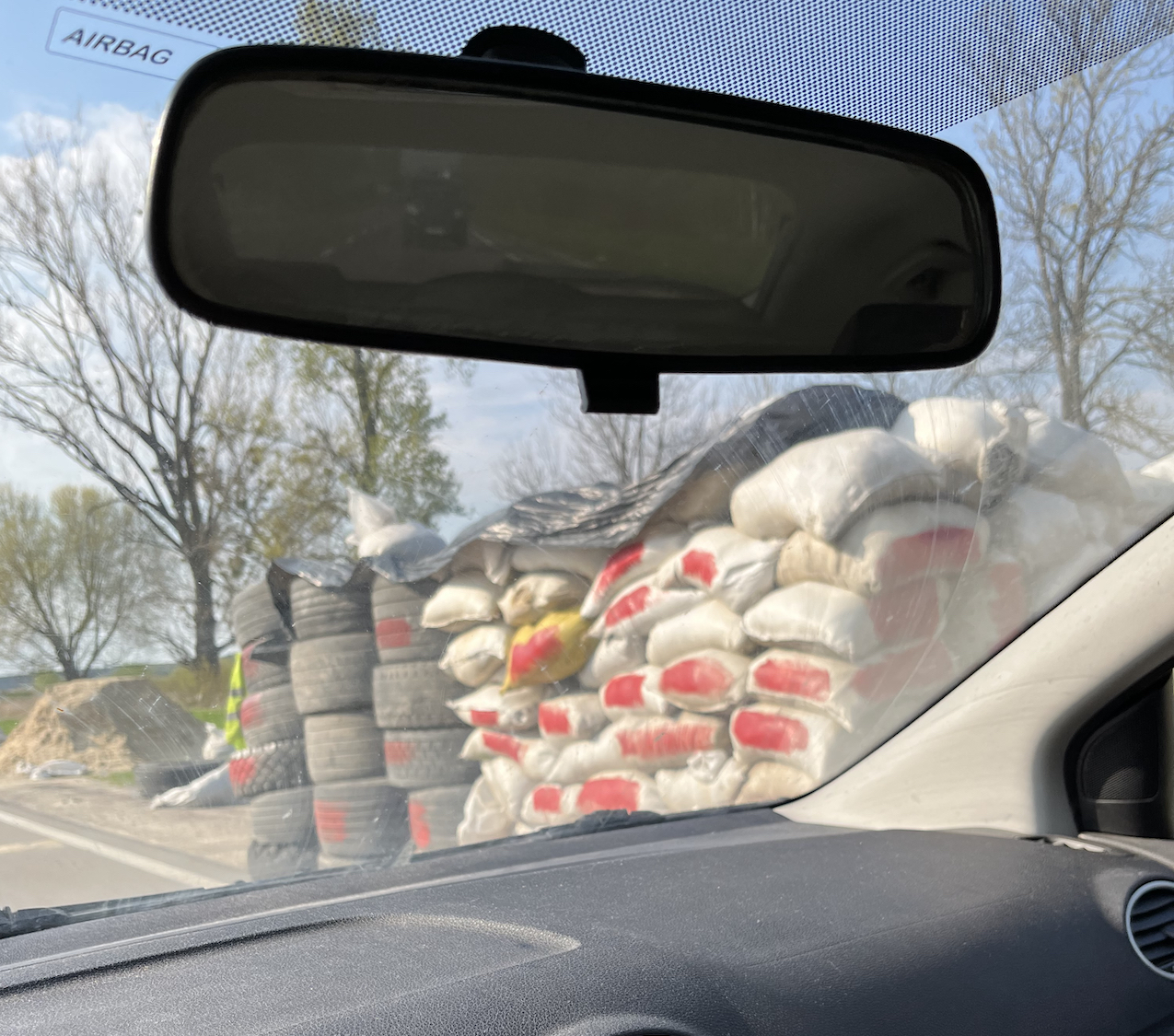
Check point into Lviv. Image courtesy of author.
Orysia had studied Estonian and been an adept young translator but now works in software marketing, from where there’s probably no way back to the humanities. She lives with her software engineer boyfriend, Andriy, in a brand-new apartment. They have two cats from a Kramatorsk refugee: huge, grey, British animals. Orysia said they don’t care to go to the air raid shelter anymore, especially because these felines – Richard, the fat tomcat, in particular – were so heavy to carry. Indeed, when the sirens go off at night, they just move to the kitchen and drink tea.
In Kharkiv oblast ‘people have learnt to discern between the whistles of different missiles. It sounds different whether it’s an Iskander M or an Iskander K,’ said Andriy. Orysia told me, you’re supposed to stay between two walls, like in a corridor, without windows during an air raid; the kitchen has windows, but they don’t face the airfield.
Both Orysia and Andriy are enthusiastic that Ukrainian national healthcare now has an e-booking system and e-patient portal. They said that the police reform of 2015 had had good results as well. At least low and medium-level corruption had been rooted out – well, what could one do with such high-level corruption! I sensed a lot of optimism in the younger generation about Ukraine’s future. They believe that investments, grants and other kinds of financial support will start pouring in from the West.
Orysia and Andriy have an extremely digitalized existence with apps for everything concerning life and the war. For starters, I have downloaded the one that wails like a siren when there’s an air raid. As each moment passes, it becomes clearer that it is Russia’s fate that will be decided by this war. Could the result of such suicide terrorism be greater parliamentarianism, the shift of power to a wider group of oligarchs or greater independence of its regions, a certain break-up? Ah, the beauty of Utopias! Russia’s threat of nuclear conflict is infantile; how long are we supposed to take this shit?
I slept very deeply with the tomcat at my feet. My pyjamas, or rather a T-shirt and leggings, kept on in readiness to run to the shelter, were full of cat hair by the morning.
Day two
Orysia made pancakes for breakfast. She told me how, even in her schooldays during the 2000s, hardly any modern Western classics could be found in Ukrainian. She and her schoolmates read these authors in Russian translation: Remarque and Austen, for example. The boom of translating literature into Ukrainian began only after Maidan in 2014. Now most books on the local market are in Ukrainian: she guessed at over 80%, but the poets and scholars I spoke to later claimed the percentage was much higher.
Neither Orysia nor Andriy had been thrilled when Zelensky was elected president. I heard from several people afterwards that intellectuals didn’t vote for Zelensky: poet and professor of Ukrainian literature Halyna Kruk confessed that she knew no one who had. Zelensky had been a candidate without a clear agenda, a blank slate and it wasn’t easy to tell whose sphere of influence he might be pulled into. There were even those who feared he might be vulnerable to a pro-Russian agenda. But everyone I spoke to agreed that he had gone through enormous development and was now the perfect representative.
Ukrainians are nevertheless amused at the Zelensky cult outside their country. If westerners relish his portrait on their pillowcases, then why not let them have it? The souvenir industry had reacted fast: T-shirts and bags went on sale sporting the president’s face, alongside the sinking Russian warship. With a show-biz president, Ukraine is receiving publicity it hasn’t seen before. Some said they weren’t quite able to envision what Zelensky, still a young man and now something of a movie star, was going to do in peacetime. People generally agreed that it’s advantageous to have a young president these days, so the whole country would seem fresh and more inspiring. Still, intellectuals seemed to put more trust in Dmytro Kuleba, the Minister of Foreign Affairs, who is even younger than Zelensky.
We met Orysia’s classmate Sofia, a poster designer and illustrator, on Virmenska Street. Sofia said that about 10% of exhibition sales go to the army now. She was so tired of living at the epicentre of shocking, drastic, pivotal events. If only they could get back to a normal, everyday routine! She took us to Zelena Kanapa (the Green Sofa) on the last day of The Blue-Yellow Album, an exhibition by Lesya Babliak. The hue of the watercolours was indeed blue and yellow; she had painted her expressionist images either referencing certain wartime photos or from memory.
On Prospect Svobody (Freedom Prospect), old men were playing chess. In the long, green park area, musicians were performing in at least three different spots. For several days, a brass band had been playing variations on James Brown’s I Feel Good. ‘So good, so good’ – Leopolitans have been concerned about feeling good. Are they allowed to do so? They’re drinking coffee, while others are dying. But the government had announced that it’s fine to feel good. ‘If we don’t feel good,’ Orysia said with an ironic smile, ‘the Russians have already won.’
When I went out to eat, the air raid siren rang out. It rang from my phone as well, the app working as it’s supposed to. Ukrainians smiled at my questioning look. They even chuckled quietly when I walked to the bar counter to ask about the shelter. They shook their heads. Why run? Everything was OK. “People on the streets kept walking with prams, no one was going to give up their tables in the outdoor cafés. In the air raid app, you can choose whether you want a female or male voice to announce the beginning and end of the threat.
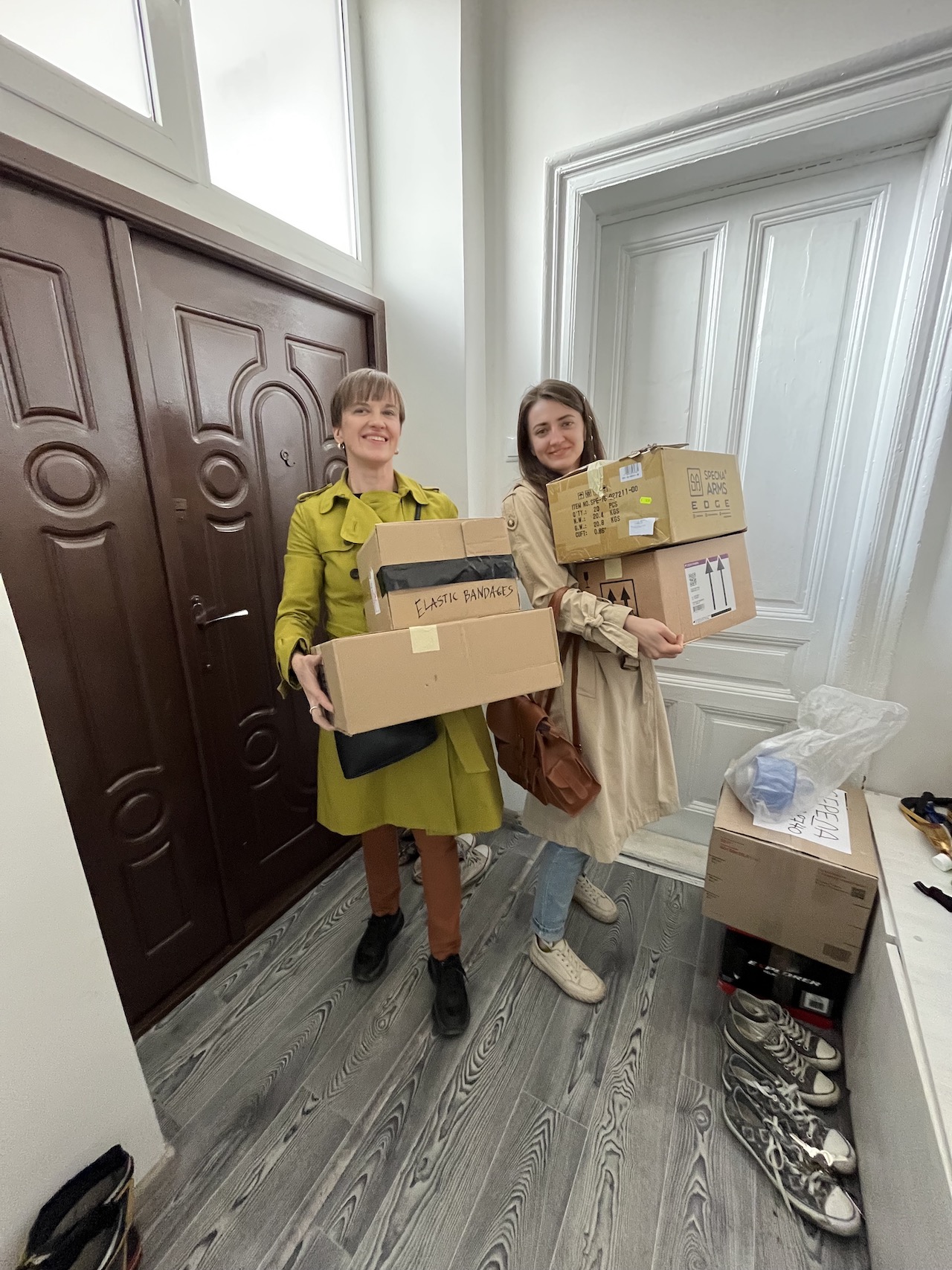
Author and Orysia delivering medical aid. Image courtesy of author.
Day three
This morning, I woke up in the city centre, in the Opera Passage Hotel with a grand view of Prospekt Svobody, the municipality towers and the Latin Cathedral. In peacetimes, the Prospekt must be roaring with life, even at night, but the curfew at 11pm means complete silence, apart from a few ambulances or police cars.
Lviv is overcrowded and packed with cars; the city of 720,000 inhabitants has received 300,000 refugees. People from the East park their cars in long rows. Drivers leave their mobile numbers on the dashboards; those who want to get moving again might have to make dozens of calls.
Orysia said many people with kids had left Lviv, but lots of children could still be seen around, also in front of the opera house in their toy cars – probably refugee kids from the East.
In the afternoon I met Ostap Slyvynsky, a charming colleague I’ve known since 2014. We sat down in an outdoor café near Les Kurbas Theatre, an area frequented by intellectuals and hipsters dressed stylishly: a bearded man with chic, pink trousers, guys with careful sock combinations. Every once in a while, somebody said ‘hello’ to Ostap.
We weren’t allowed a glass of wine. Although the alcohol ban, imposed in pubs and shops at the beginning of the war, had been lifted just before my arrival, the waitress said we could only drink coffee outside.
Ostap teaches Polish and translation at the Ivan Franko University, having himself translated Tokarczuk and Miłosz. He understands all Slavic languages, speaking seven fluently. I have always spoken English with him. I asked whether Ostap was able to handle a gun, and he said he was: at the beginning of the war, he had taken special courses; he now knew how to use a Kalashnikov, having known nothing about weapons before. ‘I didn’t want to sit at home like an idiot,’ he said. However, they didn’t accept him in the army, as there were enough men already. They’ve begun focusing on more specialized training. He had been asked whether he had received a conscription letter: ‘No? Then go home.’
At first, we talked about the disgraceful open letter German intellectuals had written to Olaf Scholz, published in Emma magazine a few days before: truly toothless blather about how Germany should ‘not supply, either directly or indirectly, further heavy weapons to Ukraine’ to avoid further ‘escalation’. They advocated for a compromise – with the aggressor. Among the signatories were Alexander Kluge, Martin Walser and Alice Schwarzer. I shared the link with a vomiting emoticon. Sure, several signatories were very old; Kluge and Walser have drifted away from current affairs. But one can grow bolder with age. I had met Schwarzer, Emma’s editor in chief and a lifelong feminist, at a women’s gathering in Vienna some years before. She appeared to be a rather extravagant pencil in the box, but back then I had thought anything was good to help the cause.
But, yes, the painful ‘German question’ had exasperated Ostap for a long time. One thing is Realpolitik, the other is the incapability or unwillingness to see or take notice of Russia’s imperialism and multiple crimes of aggression. Such an attitude may have historical reasons – ‘See, we’re not Nazis!’ – but it’s completely beside the point. Ostap had experienced such blindness at several literary events.
I was curious to know what Ostap thought of Oksana Zabuzhko’s article, published on 22 April 2022 in the Times Literary Supplement. Zabuzhko, with whom I had enjoyed a ride from Lutsk to Kyiv some years ago, had said: ‘In many ways, it was Russian literature that wove the camouflage net for Russia’s tanks.’ She believes that the attack on 24 February owes a lot to Dostoevskian thinking. I had considered it a highly original but far-fetched interpretation.
Isn’t there consensus in creative fields that no straight lines exist between things depicted in an artwork and the spectator’s or reader’s consequent actions? Can we incriminate literary works written one and a half centuries ago for being the models behind behavioural patterns within Putin’s (or Stalin’s) Russia?
In the 2008 essay ‘The Military-Poetic Complex’, Žižek wrote how ‘ethnic cleansing in Bosnia was the continuation of (a kind of) poetry by other means’. It was poets who early on ‘started to sow the seeds of aggressive nationalism’. Very well, but where do we go from there? Does writing a poem mean setting up a potential minefield? Ostap said, however, that Zabuzhko had summarized what many Ukrainian intellectuals were thinking and feeling.
As for Dostoevsky, we cannot say that all these discussions about the ‘special mission of the Russian people’ have had no weight whatsoever. But take Raskolnikov and the wish to understand a criminal mind – hasn’t this interested authors globally? What else, if not that? Ostap pointed out the question of whether social injustice may justify violence. Raskolnikov is not a villain. Besides, so many Russian literary works contain traces of colonialist thinking, be it explicit or implicit – Pushkin, for example. This is something that must be discussed. Scrutinizing these elements doesn’t mean cancelling authors. Even Gogol has now turned into a controversial figure for many Ukrainians, Ostap said. Books had been found in the bags of Russian soldiers, above all those of Gogol! It’s not easy to reinterpret Taras Bulba now.
I recently found an appallingly chauvinistic comment about Gogol by Nabokov, whose work I’ve relished so much: ‘We must thank fate (and the author’s thirst for universal fame) for his not having turned to the Ukrainian dialect as a medium of expression, because then he would have been lost. When I want a good nightmare, I imagine Gogol penning in Little Russian dialect volume after volume of Dikanka and Mirgorod stuff about ghosts haunting the banks of the Dniepr, burlesque Jews and dashing Cossacks’ – a comment as unpleasant as the antisemitism of T. S. Eliot.
While callous and sceptical literati can separate a writer’s stylistic talent and their bigoted worldview, schoolkids should be told that no writer, due to their talent, is a priori, neither automatically wise nor good.
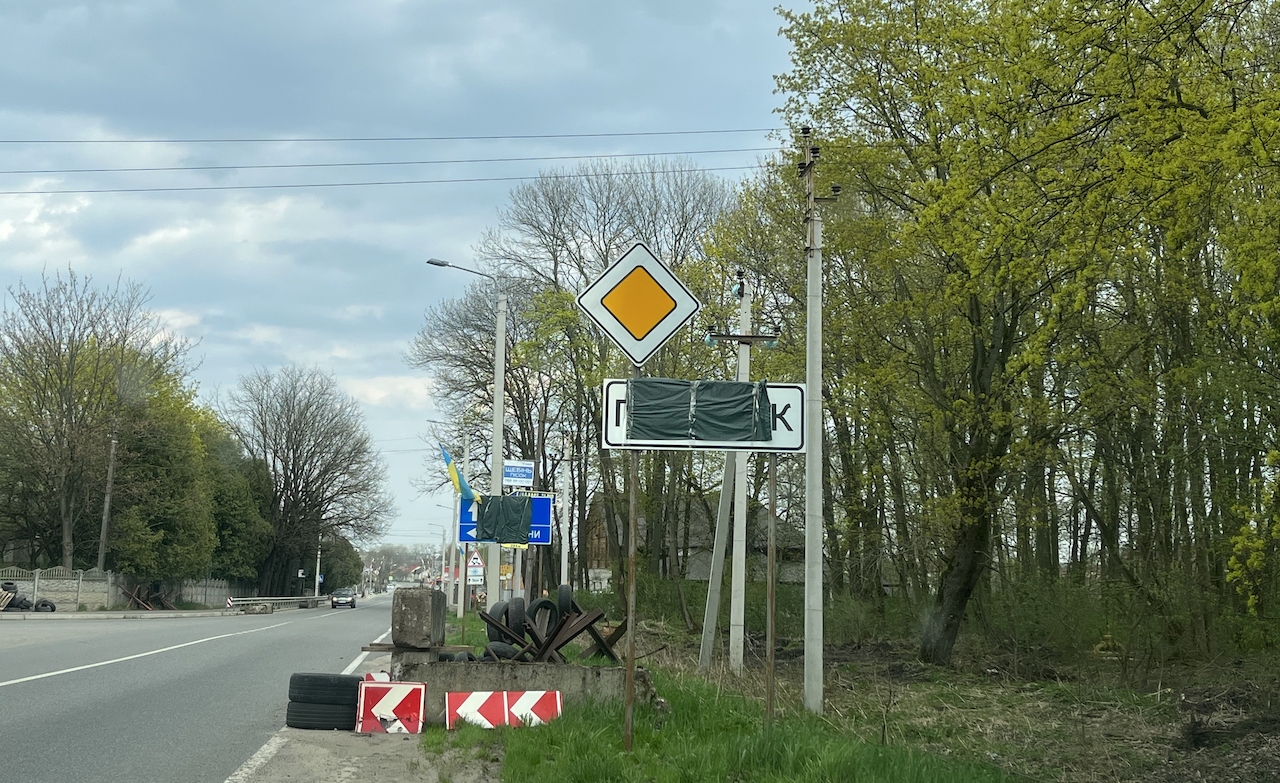
Covered signposts in Ukraine, 2022. Image courtesy of author.
I could well imagine how all this talk of Malorussia (Little Russia) has outraged Ukrainians for some time. The question arises: Why is Russia still granted delusions about its messianic mission and soul, while such ideas, if bred by other nations, seem at best absurd, at worst expressions of Nazism? Sadly, concessions to Russian imperialism seem to have been part of Western leftists’ attitude package.
Russia’s arrogance is also revealed by knowing Ukraine so poorly, Ostap said. They are ridiculously stubborn to claim that Yanukovych is still the legitimate president of Ukraine, so they proposed this taxidermied guy as the leader of the ‘denazified’ country. ‘We laughed ourselves to tears,’ Ostap said. The talk of taking Kyiv in three days was completely ignorant, too. They didn’t pay proper attention to the ‘smaller brother’, their information was faulty and partial, and this is now hitting them hard. Ukrainians applaud the corruption and decay in the Russian military – how could it be otherwise!
To my question about whether Ukrainians see any country as an example to follow, Ostap fell silent for a moment and then said, ‘No, not really, Ukraine is too particular, one of a kind.’ When I asked whether Ukraine would come out of the war a different country, he said, ‘Certainly. We’re not part of the Russian narrative anymore. We’re not victims but have a strong identity now, a feature that the world knows about: braveness.’ He smiled humorously. A degree of intellectual irony was certainly there.
Translating into Ukrainian in Soviet times, he said, was an exclusive art, exquisite, carefully done. There was no state commission: no deadlines, just personal interest. Even after independence was re-established in 1991, Ukrainian translations didn’t prosper on the market. Print runs of books in Russian were bigger, their prices lower. And everyone was able to read Russian anyway. If a Russian translation of some bestseller came on the market, the Ukrainian version often no longer sold well – that’s why the Ukrainian translation of Harry Potter was rushed through. Ostap confirmed Orysia’s claim that the translation boom started in 2014.
I was interested in whether some authors who formerly wrote in Russian had switched to Ukrainian. Andrei Kurkov may still write his crime novels in Russian, due to their distinctive style, but his children’s books, fairytales and essays are now written in Ukrainian. Volodymyr Rafeyenko, a native of Donetsk, who had won the Russian Prize as Vladimir, moved from Donbas to Kyiv and started to write in Ukrainian. The change of language and other cultural transformations inspired him to write Mondegreen in 2019, published in English in 2022.
I had read Timofei Havryliv’s literary survey published by Eurozine in 2007 and asked Ostap what the ‘Lviv text’ was that Havryliv had mentioned. Laughing, he said he wasn’t quite sure, but it was something they were searching for back then. Apparently, he and his colleagues had some complex text in mind that would include the different strata of Lviv’s culture: Ukrainian, Polish, Jewish, Austrian and Armenian. And what, I asked, about the Ukrainian Baroque? Ostap said that these were fascinating texts from the seventeenth century, when Ukrainian was a mixture of Church Slavonic, Polish and the local spoken language.
I learnt that psychoanalysis had been very much in vogue in 1990s Ukraine as well; Lacanians had been mostly active in Kyiv. In 2006 Nila Zborowska had published The Code of Ukrainian Literature: The Project of Psychohistory of Modern Ukrainian Literature, a monograph with the ambition of interpreting all modern anti-colonial literature, making use of psychoanalytic concepts such as those of Melanie Klein.1 Northrop Frye had been popular in the 1990s, when literary scholars ardently tried to fit Ukrainian literature into Jungian archetypes.
When I asked which Ukrainian works should be translated into Estonian, Ostap suggested Yuri Andrukhovych’s latest novel, Pадіо Ніч (Radio Night), because it contains all the author’s best qualities and literary devices. Andrukhovych’s daughter Sofia is also a fine writer; her novel Felix Austria, a love story about the beginning of the twentieth century when Western Ukraine was under the Austro-Hungarian Empire, has been made into an arthouse movie. But, given the chance, Ostap would translate Ukrainian literature from the 1920s, a golden age rediscovered in the 1990s. Now a series called Наші 20-тi (Our 20s) is also available. ‘Ukrainian literature could have turned into something completely different,’ said Ostap. Back then, for instance, Apollinaire was more of an example for Ukrainian poets than Mayakovsky.
He noted that there had never been such solidarity in Ukraine as there is now – neither during the Maidan nor the Orange Revolution. As for Zelensky, Ostap and his acquaintances had wondered how anyone could elect a guy like that, but no one criticizes the president now. Orysia, too, had said that if someone started to chastize the government on social media for what they had done in the past, they would be silenced with a ‘shhh, we’ll talk about that later!’ If in Maidan times there had still been some ‘grey areas’, then not now. The image of Zelensky as a movie hero made Ostap smile: he had been offered to translate Zelensky’s biography from Polish to Ukrainian. The biography industry is definitely agile!
When I suggested that Poroshenko would hardly have made a sexy wartime leader, Ostap surprised me, saying that it was hard to tell. In 2014, when Ukraine was anything but prepared for an attack, Poroshenko still behaved like a tough guy, managing to stop further aggression.
A BBC journalist had called Ostap and asked why the Ukrainians use such coarse language about the war. He had replied that maybe it’s not so nice, but that’s how one speaks now. To the question of why the Ukrainians call the Russians orcs, he had said that it’s a euphemism, which the BBC guy was happy about.
We sat in the café for a very long time, almost four hours, and it didn’t get chilly. Despite the topics, I had completely lost my sense of place. We could have been in any central Europe café under bright green, spring trees. When we finally got up to leave, I decided I would go and buy some gifts. I had already bought several pairs of Bayraktar socks: ‘Bayraktar, of course,’ Ostap said, ‘it’s even becoming fashionable to name your pet after a drone.’
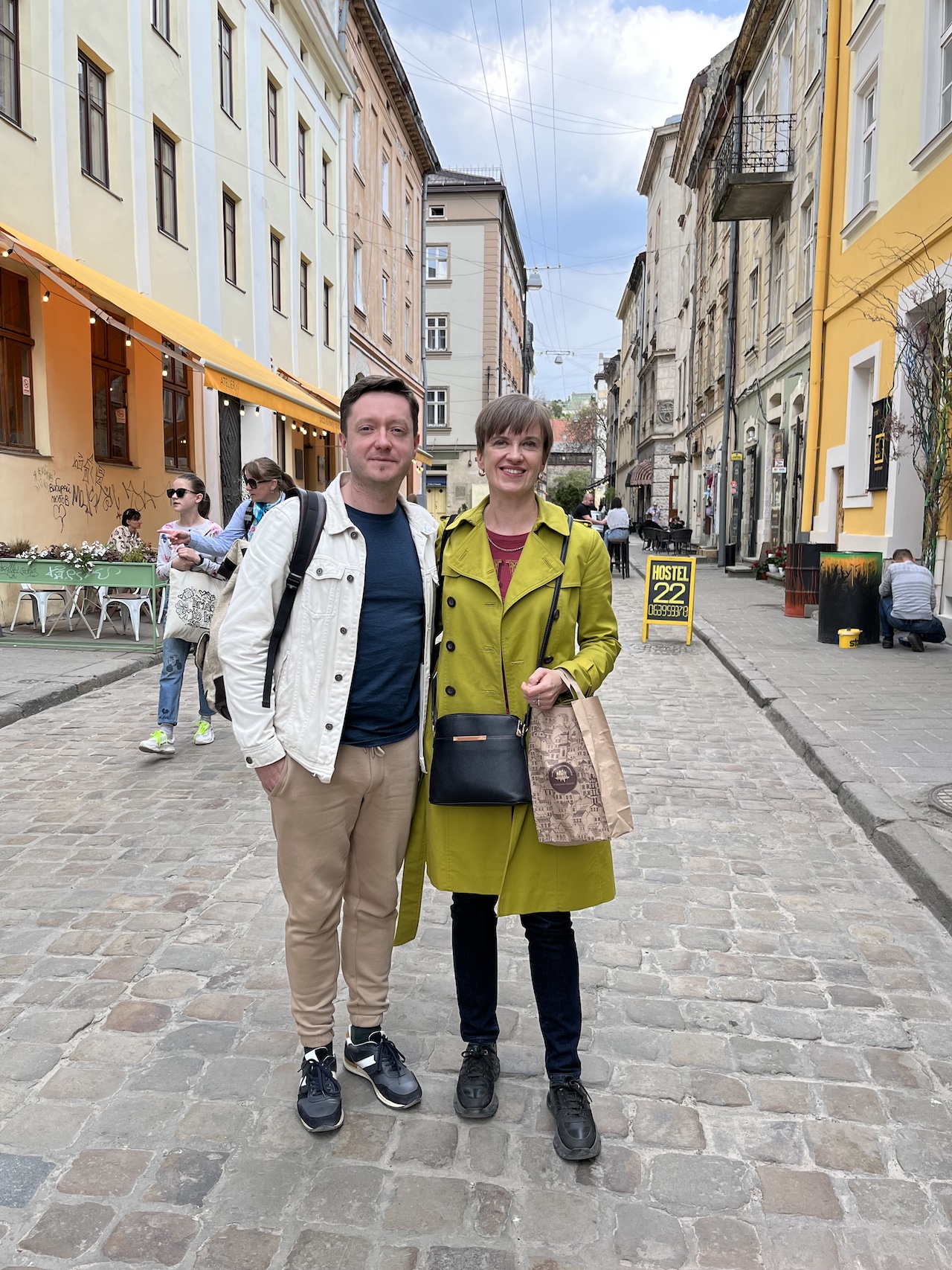
Author with Ostap Slyvynsky. Image courtesy of author.
Day four
In the afternoon I met the poet Halyna Kruk for the first time. I had brought her a copy of Looming, the Estonian magazine, where her poem had been published. We met in front of Ivan Franko University; Halyna works there as a professor of Ukrainian literature, focusing on the Ukrainian Baroque era. Lectures are currently held online, which is how it has been since the pandemic. Only for a short period in the autumn were the students in the classroom again. Those five minutes after the end of pandemic restrictions and before the start of the war were beautiful, Ukrainians say.
Halyna has translated Szymborska and Miłosz. She had learnt Polish on her own as a child from Polish TV. It was an important source of information for Western Ukrainians, not quite the same as Western European channels but still much more open than Soviet Ukrainian television – with cooler music and more exciting cartoons.
I handed her the gift bag, which contained some candy in addition to the magazine. Halyna said, in times of war, every nice gesture tends to bring tears to her eyes, rather than harsh news or a stressful situation. I heard the same from several other Ukrainians. They were moved, for example, when I said that the ERSO, our national symphony orchestra, now starts every concert with the Ukrainian anthem.
I would have usually hidden my feelings (when not anger), behaving like a hardened Eastern European, but the more time that passed, the more effort it was taking to control my emotions here.
Halyna admitted that she’s a pretty good shot. As a child, she had even gone to the shooting range, as it was part of a radio operators’ training. Her husband, a physicist by education and now a copyright specialist, had been on the front since the second day of the war. Halyna had not seen him for two months. But they usually talked on the phone twice a day. He would call Halyna whenever he had the chance.
Halyna said she could no longer read fiction, because it seemed so irrelevant and distant. She also didn’t listen to music anymore – it just didn’t work or made her cry. Although she never cried at the beginning of the war – her feelings just frozen – there had even been times when the anthem made her weep. She wasn’t writing poetry but kept a very realistic diary, noting, for example, her bodily reactions to the situation. Ostap had also told me that he couldn’t write poetry – the words just didn’t come.
I understood that very well: instead of writing or reading heartfelt poetry in some safe place, I had decided to drive to Ukraine with boxes of tourniquets and Israeli bandages, bought as donations from members of the Estonian Writers’ Union.
Halyna said she does as much volunteer work as possible to exhaust herself and sleep at night. She had no intention of leaving Ukraine, even though she kept receiving invitations to European writers’ retreats; she passed these contacts on to women with small children.
She agreed with Zabuzhko: Mumu had been a horror for her too. How can one find compassion for someone who does not resist a cruel order? Who would kill his nearest being when commanded? Reading Mumu, Halyna had realized for the first time that Russian literature, or the world it depicted, was alien to her. Of course, Turgenev just created and described a character. But all these ‘little people’ of Russian literature, who do not fight the cruelty and stupidity of power, who seem to leave everything to fate, does that not say a lot about a society, its culture and mentality? You can’t build civil society with fatalism.
Halyna found it fascinating that Ukrainians were ready to fight, to sacrifice themselves. Before Maidan, it had seemed that something like this only existed in literature and film. She had also protested and went later to Donbas to read poetry to soldiers. It was rather difficult to decide what kind of poetry you should read – certainly not pieces on war, as they know war better than poets. In the end, Halyna had chosen family topics, which had proven to be emotionally moving.
The more I talked to Ukrainians, the clearer it became that this was not the moment to recite Pushkin with peace of mind. In wartime, the cultural and psychological elements are so damn important that an argument à la ‘hey, they’re not guilty, those at odds with state power’ seems sour. Only a tactless blockhead would decide to perform Glinka’s A Life for the Tzar right now. And it’s not Ukrainians who should be expected to show lenience.
Halyna hoped for Russia’s military to weaken completely, as did Ostap. Only then would Russia be safe for its neighbours. The US Secretary of Defense, Lloyd Austin, had said: ‘We want to see Russia weakened to the degree it cannot do the kinds of things that it has done in invading Ukraine.’ There’s the danger that any partial solution would allow the Russian state to start building up its military strength again, and a ‘compromise’ about territory would keep violent conflicts seething forever. And the question of demilitarization and denazification? What a psychological projection from the Russian regime, Ukrainians said, when that is exactly what the Russian state itself needs. A militarily dismantled Russia would allow the world to read Pushkin and Dostoevsky calmly again.

Ukraine 2022. Image courtesy of author.
When I asked Halyna about the future of Ukraine, she thought that the country was too big to make simple decisions. Obviously, different regions need different strategies.
Day five
This was my last day in Ukraine. Bright light shone over Prospekt Svobody. I went out, looking for the nearest delivery company to send a book to Yuri Andrukhovych. A young waitress couldn’t help but wonder how a foreigner got to their office, stood in queues and why they wanted to send a book from one Ukrainian city to another.
I met such amazement several times: people asked me something in Ukrainian on the street (for example, if Angelina Jolie had already left the town hall), found out to their surprise that I wasn’t a local, and asked if I felt safe there. I shrugged and replied, probably as safe as they did. Safer, in fact, because I had to drive home soon. Their country was at war and further casualties were not ruled out in western Ukraine. A few weeks ago, seven people had been killed in a car service station when it was hit by a Russian missile.
The truth was I never feared for my little life in Ukraine. Looking from distance, things seem different: in a comfortable situation, the idea of taking a risk seems so uncomfortable. I remember a moment in the Falcon Hotel in Rzeszów before I started driving to the Ukrainian border: I had smeared cream on my face from a jar of l’intégral anti-âge. I thought, ‘well, maybe a missile will hit my head soon, and here I am dealing with âge or anti-âge.’ I immediately realized how foolish it seemed – egocentric and inadequate. Who needs pre-agony? A good person might not use such a cream out of solidarity with those who do not have the means to obtain it – how many Ukrainians are currently using anti-ageing creams, or practicing the violin, for example? Whoever can, goes on with their life, even with a petty-bourgeois life. If not, it would mean that the army of orcs had already won.
I met Ostap again, who helped me find salo (pork fat) on the market, which my mother had ordered. We were having our last coffee when he said, ‘We haven’t heard a siren in Lviv for more than two days now. It’s remarkable, it hasn’t been like this for a long time!’ He had hardly finished his sentence when the sirens began to wail. ‘Увага! Повітряна тривога!’ – sounds literary, but so it was.
Undoubtedly, the sound of a siren in real-time is something very important to a civilian. It proclaims that all the things we are used to may be destroyed in a moment, and the world may truly collapse. Coffee cups, beds, house walls, worn shoes, repaired cars – they are here but could soon be gone. After a few minutes, the sirens sounded again. The air raid was over.
I said goodbye to Ostap in front of the Opera Passage Hotel. It started to drizzle a bit and I felt melancholic. It almost seemed as though I shouldn’t leave Ukraine yet. But I packed my luggage and took it to the car, picked up a fine from the windscreen wipers and started driving.
A message came from Orysia. Lviv had been hit by five rockets. She sent a photo of a cloud of smoke visible from her windows. She claimed to have heard the missile flying. I had left the city, its explosions behind me.
I wondered if this trip had changed my perspective more than I had expected. Maybe. Without meeting Ukrainians face to face, I probably wouldn’t have understood their sharp sensitivity, the perception of cultural injustice, which is so deep that it could lead, among other things, to political criticism of Russian literary classics and to the wish to freeze any performance or display of Russian cultural products at the moment. In the rest of the world, perhaps everyone understands that works like Pushkin’s Poltava are not alright, but what about restrictions on works with no traces of colonial ideology? It is phenomenal how brutally the Russian state can damage its own culture.
I realized on the spot, much more sharply than from any media sources, just how many issues in history have not been satisfactorily resolved and are now re-emerging in an intensified and more painful way. The only way to solve them and to enable Russia’s cultural rehabilitation would be Ukraine’s victory.
Maarja Kangro was in Ukraine from 29 April to 3 May 2022. She wrote this blog for Vikerkaar, which was published sequentially on the journal’s website.
I later researched the book. For the author, Ukrainian literature was dominated by maternal pathos and Russian literature by paternal modes and patterns.
Published 22 June 2022
Original in Estonian
Translated by
Maarja Kangro
First published by Vikerkaar (Estonian version); Eurozine (English version)
Contributed by Vikerkaar © Maarja Kangro / Vikerkaar / Eurozine
PDF/PRINTPublished in
In collaboration with
In focal points
Newsletter
Subscribe to know what’s worth thinking about.
Related Articles
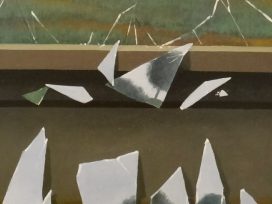
House keys recur in the stories of Crimean Tatars and Palestinians displaced from their respective homelands in the 1940s, and Ukrainian citizens fleeing Russian invasion since 2014. Ethnographic research and discourses on art and justice show how objects emblematic of home salvage the history of exiled peoples from oblivion.
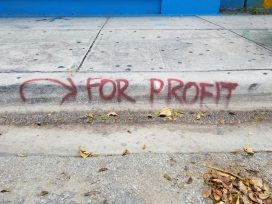
As capital consolidates, culture recedes, funding vanishes, access narrows. The question persists: why fund culture at all? Cultural managers from Austria, Hungary and Serbia discuss.

